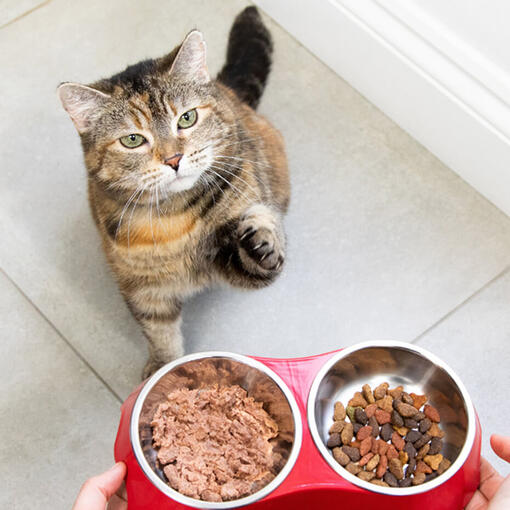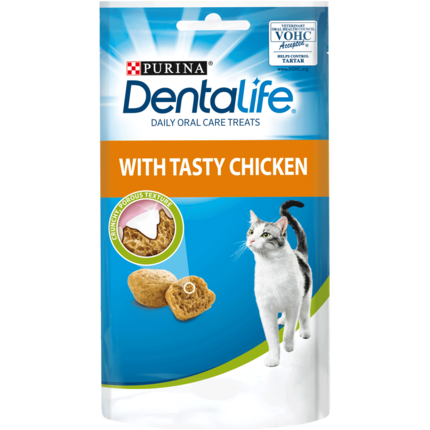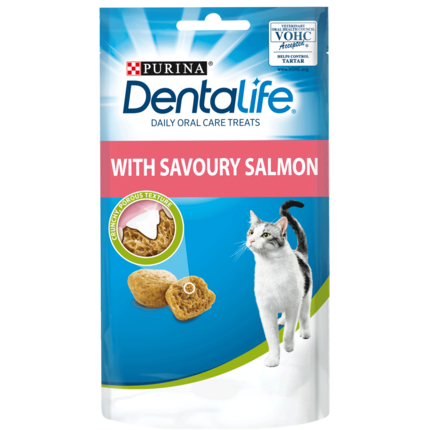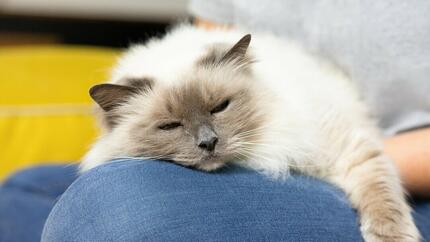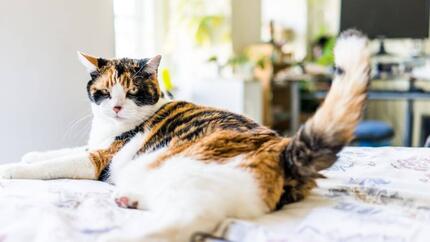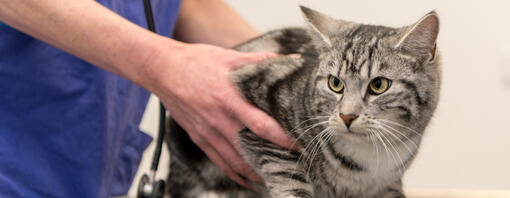
Hyperthyroidism in cats is a common disease which mainly affects middle-aged and elderly felines. Read our guide to find out everything you need to know about the condition.
Hyperthyroidism in cats is a common disease that affects middle-aged and senior cats. Hyperthyroidism refers to excessive levels of thyroid hormone being produced by the thyroid glands located in the neck. This can have significant health implications, because thyroid hormone is involved in the normal regulation of metabolic processes in the body. Therefore, the condition can affect multiple body systems.
If you are concerned that your cat might have hyperthyroidism, we’ve created this guide to tell you all you need to know about the condition, from the symptoms to watch out for to the life expectancy for hyperthyroidism in cats.
What causes hyperthyroidism in cats?
Most cases of hyperthyroidism are caused by a benign tumour of the thyroid gland leading to excessive thyroid hormone production. However, the tumour can be malignant and spread within the body in a small proportion of cases. You may hear the terms T3 and T4 used – with T3 referring to triiodothyronine which is the active form of the hormone and T4 referring to thyroxine which is the precursor for this. Blood levels of both of these forms of the thyroid hormone can be tested as part of the diagnostic process.
Symptoms of hyperthyroidism in cats
The thyroid hormones have an important role in regulating many of your cat’s body processes including metabolism, blood pressure, heart rate, body temperature and even gastrointestinal function.
Here is a list of possible symptoms that you may notice:
- Weight loss (despite good appetite) – use our cat body condition tool to assess this.
- Increased appetite and food intake.
- Increased drinking.
- Increased urination.
- Hyperactivity.
- Panting.
- Vomiting and/or diarrhoea.
- Coat changes – their coat may appear unkempt, matted, or greasy.
Cat hyperthyroidism diagnosis
In order to diagnose hyperthyroidism in cats, your vet will first conduct a physical examination. The enlarged thyroid gland is not usually visible, so they’ll need to carefully feel the gland for signs of a goitre (swelling of the thyroid gland). However, in some cases of hyperthyroidism a goitre will not be palpable.
It is likely that your vet will do blood tests in order to measure the levels of thyroid hormones in the blood. Most cats will have increased levels of T3 and/or T4 in their blood. In some cases, elevated levels may not be present and further tests and examinations will need to be conducted to confirm. This can occur, for example, if your cat has a concurrent illness which reduces the measurable levels of T4 in the blood.
Cat hyperthyroidism treatment
There are several treatments available for hyperthyroidism in cats and your vet will be able to assess which is right for you and your feline.
Daily medication
The most common treatment option is daily medication to inactivate the excessive amounts of thyroid hormone from the overactive thyroid gland. This is a lifelong treatment and will need to be administered at least once a day as prescribed by a vet, either in tablet or liquid form, or as a gel applied to the ear. With this treatment your cat will need regular vet check-ups and blood tests. Your cat’s condition will be managed rather than cured by this medication, and symptoms will return if it is stopped at any point.
Surgery
In certain cases, surgery may be suggested to remove one or both of the thyroid glands. You will usually need to administer daily hyperthyroid medication for the 3 to 4 weeks prior to surgery to help stabilise your cat and reduce anaesthetic risks.
As with any surgery, there are certain risks attached. The parathyroid gland (responsible for controlling calcium levels) is located next to the thyroid gland and there’s a possibility that these may become damaged during surgery. Calcium levels are often checked after surgery for this reason. Additionally, if only one gland is removed there is a chance that the remaining gland may still produce excess thyroid hormones.
If you and your vet decide to go down this route, read our guide to helping your cat recover from surgery.
Radioactive iodine therapy
This is a less common form of treatment for hyperthyroidism in cats. The therapy is administered via injection under the skin and targets the abnormal thyroid tissue with radioactive iodine.
This leads to the destruction of the affected tissues with minimal damage to healthy glands or tissue. This treatment option can be very effective – however it’s worth noting that your cat will need to be hospitalised in a special radioactivity unit for up to six weeks.
What to feed a cat with hyperthyroidism
The best way to manage hyperthyroidism is by consulting a veterinarian for a tailored treatment plan. They will be able to discuss all the options, including suitable diets for your feline friend. However, there are some general recommendations you might consider when looking to feed your cat a healthy diet:
- High-quality protein – Since cats are obligate carnivores, they need a diet rich in high-quality animal protein, this is particularly important for cats suffering from hyperthyroidism, who are more likely to be elderly and also have kidney problems. If your cat is older, a senior diet is usually best, but it’s worth checking with your vet as conditions like kidney disease can heavily influence the best diet for your cat.
- Limited carbohydrates – Cats’ digestive systems are not designed to metabolise large amounts of carbohydrates, as they gain their energy from protein and fat and are not adapted to digesting significant amounts of carbohydrate. Carbohydrates may also lead to weight gain which might affect your cat’s health in the long run.
- Low iodine diet – Sometimes hyperthyroidism in cats can be managed through controlling iodine levels in their diet. This involves feeding a special diet and nothing else, so may not suited be sufficient to treat outdoor cats who can get their paws on other food or small mammals. The reason for feeding a low iodine diet is that iodine is required to produce thyroid hormone, therefore restricting it can be effective at managing some hyperthyroid cats.
- Moisture content – Cats often have a low thirst drive and don’t always drink as much water as they should, when they are suffering from hyperthyroidism, they may be thirstier and need to drink more than usual. Consider feeding your cat wet or canned food as it contains higher water content and will ensure that they get enough moisture in their diet. Adequate hydration is necessary for a good kidney function and overall health.
Is hyperthyroidism in cats painful?
While hyperthyroidism in cats is not typically associated with pain, it can result in some uncomfortable symptoms like increased hunger increased thirst and urination, restlessness, or even vomiting and diarrhoea. However, a veterinarian should be able to recommend an appropriate treatment for your cat’s hyperthyroidism which will help to manage it and ensure that they live a happy life.
What cat breeds are more predisposed to hyperthyroidism?
It seems that the older cats get, the more prone they become to developing hyperthyroidism. However, any breed can end up with this diagnostic, so all owners should be on the lookout for its signature symptoms. According to vcahospitals.com, a few cat breeds are known to be less often diagnosed with hyperthyroidism: Siamese, Burmese, Persian, Abyssinian, and Himalayan breeds.
Late-stage hyperthyroidism in cats
If the illness keeps progressing despite the treatment recommended by the vet, or if the condition is discovered late, the cat might struggle with weight loss, kidney problems and even vision loss during the advanced stages of hyperthyroidism. Heart problems are also quite common and can become fatal. So, it’s important to talk to your vet as soon as any unusual signs appear and not leave the condition untreated.
Life expectancy of cats with hyperthyroidism
Cats with a diagnosis of hyperthyroidism can live happily for many years with appropriate management and lifelong monitoring. Seeking veterinary advice early can be very beneficial, so that your cat can receive treatment before they lose too much weight or suffer from the effects on their vital organs. Some vet clinics offer annual blood tests for senior cats – these tend to include screening for conditions that are common in this age group and can help with early detection of hyperthyroidism.
If you want to find out more about cat health and nutrition, read our guide to hernias in cats next.


